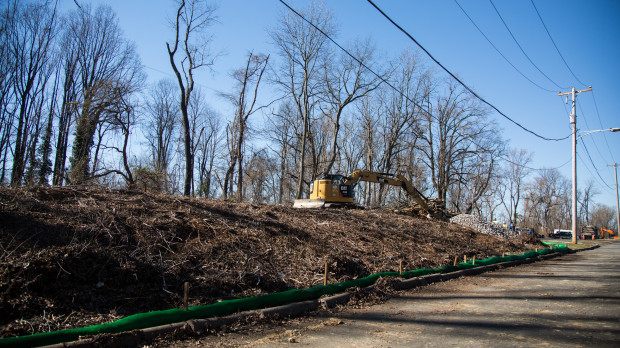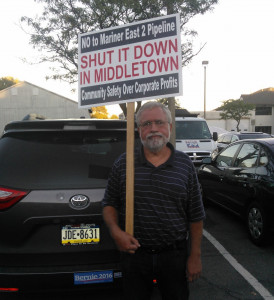Middletown residents sue Sunoco to stop pipeline, alleging violation of township ordinance

Emily Cohen / for StateImpact PA
Construction equipment clears trees in Aston, Delaware County to make way for the Mariner East 2 natural gas liquids pipeline.
Six residents of Middletown Township, Delaware County, are suing Sunoco Logistics, saying that its planned Mariner East 2 pipelines would violate a township ordinance that requires a pipeline to be at least 75 feet from occupied structures.
The suit, filed in the Delaware Court of Common Pleas on Friday, says that each of the plaintiffs lives less than 75 feet from the route where the two new pipelines would carry highly pressurized ethane, propane and butane.
The suit, which seeks enforcement of the ordinance, is part of a strategy by citizens’ groups in Middletown and some nearby communities to use municipal regulations to force changes in the construction of a pipeline that opponents say is a threat to public safety. It follows legal memos sent to nearby Thornbury and West Goshen townships earlier this year, urging them to enforce their own ordinances that activists said would be violated by the pipelines.
Although communities along the 350-mile cross-state route have been living with pipelines such as the existing Mariner East 1 line for decades, the older lines were not typically a source of concern because they carried natural gas or refined products such as gasoline and jet fuel. Those materials, though potentially explosive, are less volatile and less energy-dense than the natural gas liquids that are now being pumped by Mariner East 1, and will be carried by Mariner East 2.
The planned new line, which has been under construction since February, is far more of a threat because of the high pressure at which its contents will be carried; the explosive nature of the gases if released into the atmosphere, and the fact that they are colorless and odorless, so may not be detected by residents if there is a leak, said Michael Bomstein, an attorney for the plaintiffs.
“What is the likelihood of a leak event, and how serious is it likely to be?” said Bomstein. “When those two factors converge, the disaster potential is very significant.”
According to an independent investigation commissioned by the Middletown Coalition for Community Safety, and published in March, a leak of natural gas liquids from Mariner East 2 could result in a flammable vapor cloud that could spread 1,800 feet downwind within three minutes of escaping.
Jeff Shields, a spokesman for Sunoco, declined to comment on the suit. The company has repeatedly stated that its pipelines are safe, and that Mariner East 2 is subject to state and federal regulation.

Jon Hurdle / StateImpact PA
Mitch Trembicki, an opponent of the Mariner East 2 pipeline project, holds a sign ahead of a meeting about the pipeline project.
Sunoco also highlights an independent assessment for nearby West Goshen Township, which concluded that the project met or exceeded federal safety standards. But critics’ claims that Sunoco pipelines have a poor safety record were fueled on April 1 when Mariner East 1 leaked 20 barrels of ethane and propane at a site near Morgantown, Berks County.
Bruce Clark, township manager for Middletown Township, did not return a phone call seeking comment.
Section 210-37 of the Middletown code says the minimum distance between a “dwelling unit” and a natural gas pipeline must be 75 feet but the plaintiffs say the line would run closer than that to their homes. In the case of plaintiff Alison Higgins, the pipeline is expected to run about 17 feet from her home, according to Bomstein.
Bomstein said the plaintiffs are entitled to sue the company but not the township, even though the suit is asking the court to require enforcement of the ordinance.
In its argument that municipalities have a right to regulate the oil and gas industry, the suit cites the Pennsylvania Supreme Court’s landmark Robinson Township ruling in 2013 in which the court said townships like Middletown are entitled to regulate “environmental impact, setback distances, and the siting of oil and gas wells in land use districts.”
The suit urged the court to grant its request for the sake of public safety. “The issuance of the requested relief will be in the public’s best interests as it will reduce the risk of harm to Township residents from the proposed pipelines, and it will ensure the consistent, uniform and valid administration of the Zoning Ordinance in Middletown Township,” the complaint said.
The $2.5 billion Mariner East 2 pipeline project is under construction after getting its final permits from the Department of Environmental Protection in February. By the third quarter of this year, the first pipeline is due to start carrying natural gas liquids from the Marcellus Shale of southwestern Pennsylvania to an export terminal at Marcus Hook in Delaware County.
John Dernbach, a professor of environmental law at Widener University, said the suit has the potential to cause a problem for the pipeline if the plaintiffs can prove that its route violates the setback provisions in the ordinance. They are helped by the fact that municipalities do have some power to regulate oil and gas development on their land, he said.
“They have made a legally plausible claim,” he said
















